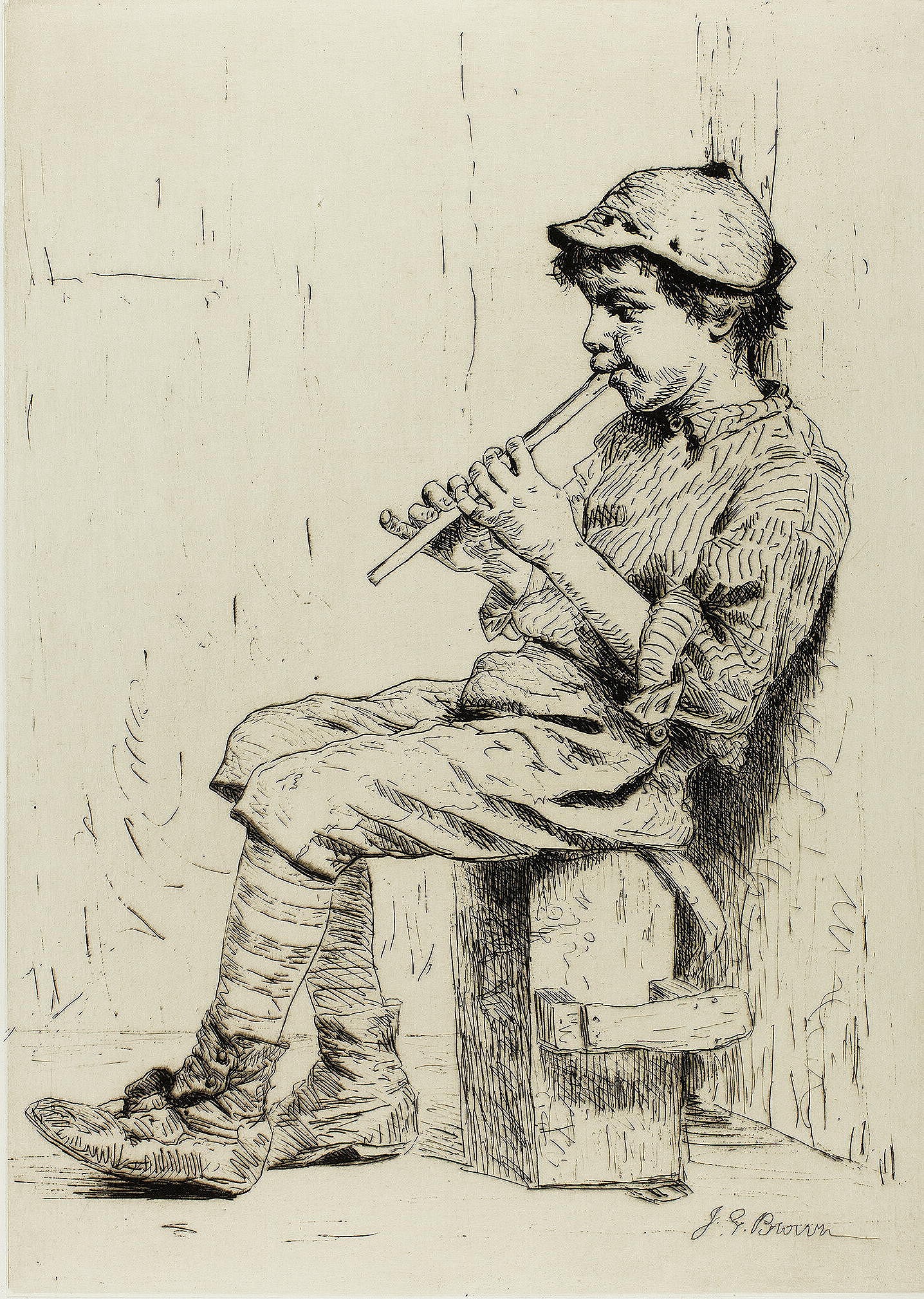RealPlay

John George Brown: Boy Playing a Flute Date (c. 1860)
" … the play seems too real to be too serious."
©2022 by David A. Schmaltz - all rights reserved
Anyone raised under The Protestant Work Ethic should find confusing the concept of playing for work. I suppose all entertainers suffer from some of this muddle, with comedians perhaps suffering most, for they slave away in laughter mines more oppressive than South African diamond ones. Musicians, though, too, also deal with material most closely correlated with leisure. Their work is their audience's play. They are even said to "be playing" when they perform their work. They're supposed to at least appear light-hearted and, dare I say (in the most traditional way) gay whenever they're up on stage. Nobody pays good money to watch a morose bluesman perform. His lyrics might describe absolute despondency, but the ethic governing its presentation insists that the performer definitely not be suffering when recounting his humiliation at the hands of some two-timing nobody, his reported "baby." He's supposed to be above actually grieving over the experience and somehow, paradoxically, be absolutely reveling in it. "My baby left me, cha cha cha!"
The songwriter, too, suffers from expectations, or can if not properly disciplined. Songwriting, no less or more than performing, seems too serious of a business to take too seriously. It must be engaged in light-heartedly. The serious songwriting business seems deep down frivolous, almost entirely unlike what any real job or even RealPlay should require. More than a superficial level of care seems necessary. Perhaps Punchinello performs this service, a broken-hearted clown too ridiculous to take very tragically, engaging in the most serious of business, as a form of others' entertainment; tears of a clown-quality performances only, please. Most of my songs, the ones I've written, are serious works exposing delicate emotions. Only a few qualify as in any way silly, but even those can be performed too casually and undermine their intention. The conventions of musical performance must be maintained however otherwise light or heavy-hearted the delivery.
Performers throughout history have fallen into their responsibilities, some taking to drink to resolve the fundamental contradictions of their working lives. Sixties rock band musicians notoriously heavily used drugs to dull the paradox, though they often claimed to be seeking enlightenment or insight. I suspect they were often dulling stage fright, not the terror accompanying performing in front of a crowd, but the terror haunting anyone in continual danger of being found out. To play for work induces the most virulent cases of Imposter Syndrome. What if they find out that I'm not the party animal I was supposed to be? What if they catch me crying when I'm playing my blues? What if the real story slips through my defensive stage persona? What if I cannot manage to maintain the necessary contradictions underpinning my performance? Who would I have to become then?
It's common knowledge that any average twelve year old, given a guitar, becomes a poet, dispensing advice as if experienced beyond their years. It's a common and familiar trance in this and many other cultures. Only a select few of these nascent poets survive into adulthood, thank heavens, but those that do survive tend to become damned persistent and seemingly almost omniscient. They spout predictions like the Oracle of freaking Delphi, with apparent indifference bordering on presumptive omniscience. They tell morality tales as if they, themselves, were moral, and cautionary ones as if they had never been cornered and killed. They pose as if street-hardened veterans when they're actually stunningly human, the tough-guy dialect almost pure fiction. They grow up to be children pretending to be wise, professionally dependent upon appreciative audiences. They are certifiably insane, or would be if anyone really cared to certify them. They write songs. They perform them. They receive applause, the front-handed thanks bestowing the most back-handed appreciations. It's RealPlay where the play seems too real to be too serious. My songs are mostly confessions of this.


